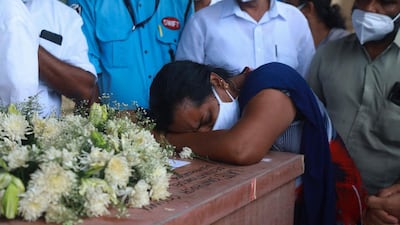Fear and despair rules the streets of Baidpura village in northern India after a spate of deaths, as the country’s second wave of the coronavirus pandemic sweeps through its vast rural landscape where access to testing centres and health services is scarce.
More than a dozen people died of Covid-19 this month in the village of 3,500 people, and many others are showing symptoms, residents say.
"The situation in the village is grim. There is not a single family that is not showing Covid symptoms – cough, fever, body ache. They are complaining of loss of taste and smell but no one is certain if it is covid,” said Mahavir Nagar, a resident of the village in Uttar Pradesh state.
"How will they know? No tests are happening in the village and people have no money to travel to city hospitals or labs," Mr Nagar told The National.
Mr Nagar said his sister-in-law died of Covid-19 after her treatment was delayed because she could not be tested in time.
“By the time she was tested and a hospital bed was arranged, 80 per cent of her lungs had been infected,” he said.
The village, about 60 kilometres from capital New Delhi, has a small charitable clinic manned by paramedics, which charges only nominal fees, while the population relies on hospitals in Greater Noida, a satellite city some 20km away, that was itself overwhelmed by Covid-19 cases and a shortage of beds.
Although India has recently witnessed a sharp drop in daily cases, from a peak of 400,000-plus in early May to about 250,000 on Friday, experts say Covid-19 infections are rising in rural areas undetected.
"Earlier stages of the pandemic were largely urban focused but the pandemic is spreading through a large part of rural India," said Dr Anant Bhan, a leading expert in bioethics and health policy.
"It is a concern because testing is not as widely available, healthcare facilities are not as widely available. Will they have access to quick quality treatment, referral linkages? Ambulance services may be not available all the time and it is a cause of worry," Dr Bhan told The National.
In a sign that not all cases and deaths are accounted for, dozens of bodies of suspected Covid-19 cases were found floating in the Ganges river in at least three districts of Uttar Pradesh last week.
In the remote village of Pikitcha in Jaunpur district, home to about 1,000 people, at least 25 people have died in May after the infection spread through the rural hamlet.
“People are dying at homes without treatment,” said Bhavani Prasad, who lost three family members.
“First my sister-in-law then my brother and then my mother, all of them fell sick in a span of four days. They had similar symptoms, breathlessness, cough and fever. Other people in the village also developed similar symptoms and some of them visited the hospital and confirmed they were positive. We also scrambled to get them treated but they couldn’t recover.”
“Most villagers are daily wagers and cannot afford medical expenses and there is no government help coming. The nearest hospital is about 100 kilometres from our village,” he said.
According to World Health Organisation figures, rural India has less than a million healthcare workers, including doctors and nurses, who are catering to hundreds of millions of people in the small towns and villages of the country.
Not far from Baidpura is Shahberi, a village of about 2,000 people where more than 45 people died in the past 15 days after showing symptoms of Covid-19, residents said.
“We have had 40-45 deaths in the village, at least 25 burials in the last two weeks,” said Anees Khan, a 28-year-old gym owner.
Mr Khan lost his father, uncle and grandmother to the deadly infection in a span of 15 days.
As more people fell ill and panic spread, Mr Anees said he asked the local administration to set up a testing camp to check for Covid-19 cases and to sanitise the village.
"But there has been no help so far," he told The National.
“Most of the villagers have fever but they can’t travel to faraway hospitals and pay 800-1500 Rupees [$12-20] for tests. There is no hospital in the village and the nearest hospital is 150km away.”
Without guidance from trained health workers, the villagers, most of whom are illiterate farm workers, are relying on age-old unscientific methods, such as sleeping under neem trees to increase oxygen levels and taking herbal concoctions to fight the infection.
As the news spread, the local administration set up a testing camp but took just 77 samples, said Yogesh Talan, the former head of Mewla Gopalgarh village in Gautam Budh, Uttar Pradesh.
"There are 4,000-5,000 villagers and they took just 77 samples. We have had five deaths already. I am worried and sad that the infection will spread like a wildfire in the village and claim more lives but the administration doesn't care," Mr Talan told The National.



















